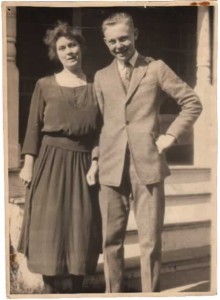R.C. Builds a Radioset
R.C. Builds a Radio
Late in 1924 my father, R.C., began staying up nights alone in his attic bedroom searching the airwaves for radio signals. He was eighteen years old and waiting to begin college. After his death I found the Radio Log & Call Book he kept back then and had carefully preserved as a souvenir for himself.
R.C. Was not a social being and all his life seemed content with interests and hobbies he could pursue in solitude. When he came home from Europe in late 1945, I was three years old. I’m not sure he knew what to do with a miniature facsimile of himself. He tried to act the role of, “Dad,” but he hadn’t much experience. His father, Ray Carroll, was away from home much of the time R.C. was growing up.
So anyway, while manufacturers were selling table top and cabinet console models to satisfy the craze created by the novelty of radio, other listeners took to making their own simple receivers. With a piece of lead galena crystal, a cat whisker detector, an empty cardboard Quaker Oats container, and few other parts, R.C. had built his own. In the log book he itemized expenditures for parts totaling: $17.25. In the same log book he had also confided the schematic diagram of the radios he assembled. Curiously, there is no mention of a cash outlay for, “copper wire.”
Actually, building a radio receiver and listening to broadcasts was a perfect hobby for my father. He had no desire to be a “ham.” he was happier listening to others than to broadcast himself.
During the day he worked in a factory winding copper wires around armatures for small electric motors that powered the bellows of pipe organs or the action of player pianos, waiting to hear from the Admissions Office of Columbia College.
In the evening, after supper he would leave his younger sisters to their homework and retire upstairs. “The ‘sferics at night gave the best reception from the transmitters farthest away,” I once heard him say.
If there was no danger of lightning strikes, he would connect his radio to the 200′ copper wire antenna he had stretched between his small window and a nearby tree.
Once the radio was warmed up he would stalk the airwaves. Working the whisker along the copper wire wrapped Quaker Oats cylinder he would bring in whatever programming commercial broadcasters were transmitting.
In his log book he would record details of the magic he had conjured from the ether. He would fill in the station “call” letters, broadcast frequency, distance from Hope Street, Stamford, Connecticut, and signal strength. Almost as an afterthought he would note the content. The miracle was in the acquisition of the broadcast, not in the programming.
I wished he had shown me this log book, with all the information noted down, when we could have looked over this memento together and enjoyed his memories of the early days of radio. Now, I can only piece together his life and these times from casual remarks he made as I was growing up and this little Radio Log & Call Book.
But, I have learned a couple of things: 1. That copper wire played a role in his life, and 2. That once upon a time my father felt the excitement and romance of teasing words and music out of the starry night.
-2-
I wished he had shown me this log book, with all this information noted down, when we could have shared a conversation over this memento and his interest in the early days of radio. Now, I can only piece together his life and these times together from casual remarks he made as I was growing up and this Radio Log & Call Book.
But I do know a couple of things: 1. That copper wire played a role in his life, and 2. That once upon a time my father felt the excitement and romance of teasing words and music out of the starry night.
(save this below for another article)
During the day, he worked in a factory winding copper wires around armatures to fit into small electric motors that powered the bellows of pipe organs or the action of player pianos.
Actually, he was waiting to begin college in New York City. The reason for the delay, I recently learned from the Columbia University Archives (thank you Jocelyn Wilk,) was that R.C. was waiting for his Father to graduate from Columbia before he could begin.his own studies.
I suspect the reason for this, “One at a time,” approach was due to the benifecence of my Great Great Aunt Harriett (search; Harriett Risley Foote) who was in a position and had the desire to help out financially over time; But to pay for two matriculating Risleys at once may have been a little too much
So, for another year R.C. would continue to wind wires around armatures by day and to tease words and music out of the starry night.
